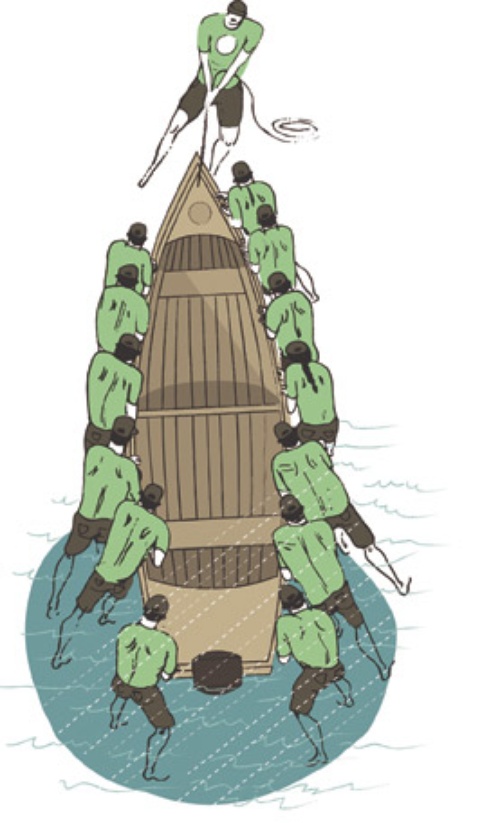 Illustration by Genevieve Simms.
Illustration by Genevieve Simms.
The Boat Pull
As the storm rolls in, Anna Maxymiw participates in a boys-only ritual.
At the wilderness lodge, a fly-in fishing camp just south of James Bay, the female staff stays on land. The shoreline is for the male staff, for the boys. Girls steer clear of the water’s edge and stay away from the docks. And most of all, girls don’t pull boats. We don’t get to feel the weight of a slick gunwale in our palm, don’t get to work out our aggressions through the bowl of a freight canoe. Girls sit and girls watch.
When the boys pull boats, they are selkies. Their green staff shirts stick to the skin of their backs, cloth wet from sweat and from the frothing, shallow water. They pull on their gloves with grim determination and their teeth. They crack their lower backs and their shoulders and their necks, practicing their own form of northern shoreline yoga; preparing for the nightly ritual. Intensely focused, they bray, moving hand over hand up the length of the coarse boat rope to heave each of the camp’s half-ton freight canoes out of the water and up onto rails. When pulling boats, the boys each have their own position, and the positions never change. Sweetpea and Stu the Rook and Dave hold the gunwales. Big Rob anchors the rope at the very end, up near the shoreline, and Jojo stands beside him. Tom brings up the rear, shouting that everyone should keep pulling, keep pulling harder.
When the boys pull boats, they run over wet boat rails caked with clay. The rails, whole peeled black spruce trees nailed into place like latticework across the shoreline, are designed to cup a boat’s hull and to hold it still. The boys jump from rail to slick rail mid-pull, moving their feet even as the boat rope is taut in their hands. They keep themselves aloft on the wood even as a thousand-pound cargo canoe barrels toward them. If they fall, they get caught under the boat. They break a leg. They twist an arm. If they fall, they hit their heads on the rocks. So they don’t fall.
Dave looks up at me from the shoreline. The rest of the boys stand behind him, legs akimbo. Their eyes are volatile in the dim light. A rain is coming in. We can smell it on the shoulder-bones of the thick, humid wind that is curling our hair around our heads. The meat under our tongues swells with the rising static in the air. The other girls are all spending their night off in their cabins, wrapped around comic books and headphones, but I remain outside, stubborn.
If the boats sit in the water and bad weather hits, they thump and shudder against the rocky shore, and irreparable damage is done to their bottoms. Pulling boats up onto the rails makes them immovable. It ensures that they will last through the night. On the evenings when storms gather at dusk, boats are pulled with a frenetic insistence. Nobody wants to be caught with a hand on a metal gunwale when lightning smacks the water.
“Wanna help?”
Yes.
“There’s only one rule for boat pull,” Dave says. “Don’t fall.”
I am still.
“If you fall,” Jojo says, talking to me like I’m an idiot, “we hump you.” He speaks gleefully, his face speckled with wet clay from the mucky waterline, and the storm unfurls itself behind his head, moving across the lake. We can see the lightning even from where we stand on the far shore. I move my weight from one leg to another. Dave stares up at me. They all stare up at me. Jojo laughs, a harsh sound that doesn’t fit with the wind, and Big Rob joins in.
All of a sudden there are too many things to concentrate on. Don’t slip on the wet rails. Don’t get your leg trapped under the boat. Don’t stop pulling no matter what you do, because if you stop someone else will have to take on all your weight, and injuries will happen. And now, don’t fall, even on the dry, safe shore, because if you do—if I do—I get swarmed.
“Fine.”
We stand shoulder-to-shoulder with each other, and I think to myself that from out on the water, from the vantage point of the storm, we all look the same: gender muddy, dressed in the same colour, heads bent the same way, necks tight with anticipation and desperate laughter. We can smell each other—bad shadfly moult, briny hair, Canadian-shield granite—and as we shift and tighten the ropes in our hands, we feel each other’s muscles slacken and respond like lake waves. I am down on the waterline, my feet on the boys’ sacred ground. My hands are around the boat rope, palms carving a new path. Tom straightens up from his position at the back of the boat, and as he opens his mouth, I twist the rope around my hands. I huddle into Dave and Big Rob and hope that next time I pull I get to touch the gunwales, that next time I get to skitter across the rails, too. I hope that I become nimble, that I don’t fall, that the lodge manager doesn’t come and see me hunkered down with the boys and tell me to piss off back to the upper shore. I hope that I can pull as well as they can, and then Tom starts to count and we breathe out together, a lung, a ragged cabal, an intricate braid of bodies, and then we pull.





